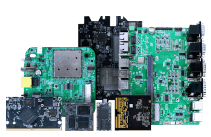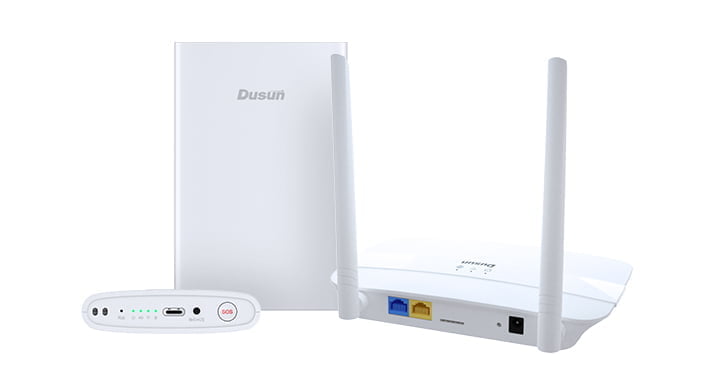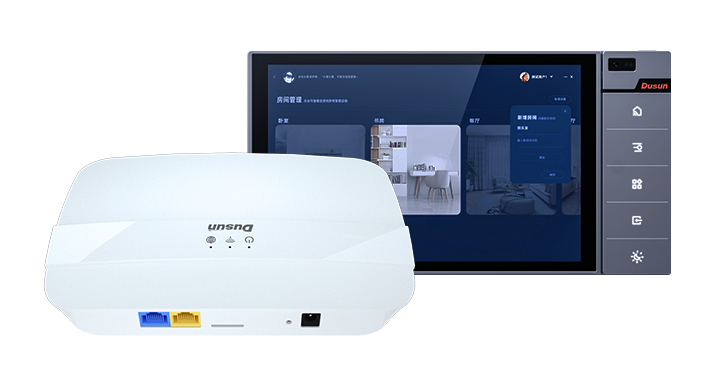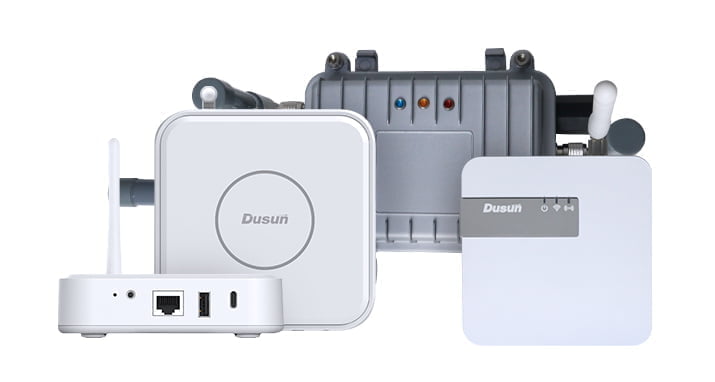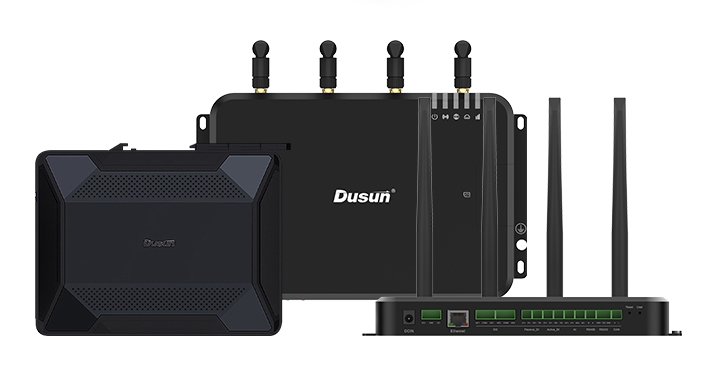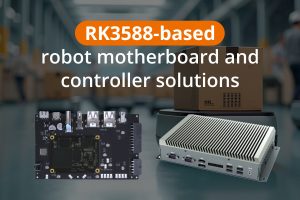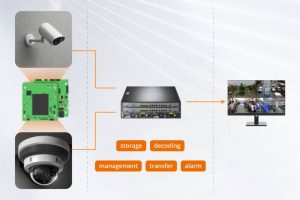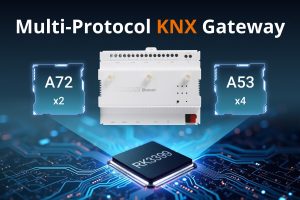1. Introduction of DSM-05D BLE Module
DSM-05D is a low power-consuming embedded BLE module developed By Roombanker. It consists of the highly integrated wireless radio processor chip, EFR32BG21A020F768IM32-B, and several peripherals, with a built-in BLE protocol stack and robust library functions.
This data terminal device is embedded with the high-performance 32-bit 80 MHz ARM Cortex®-M33 CPU with DSP instructions and floating point unit for efficient signal processing, 768 KB flash memory, 64 KB RAM data memory, and robust peripheral resources. It is mainly used for BLE coordinator device to support BLE 5.1 protocol stack.
- High-performance 32-bit 80 MHz ARM Cortex®-M33 with DSP instructions and floating point unit for efficient signal processing
- Up to 768kB Flash programming memory
- Up to 64kB RAM data memory
- Working voltage: 1.71 V to 3.8 V
- BLE operating feature
- Bluetooth 5.1 and Bluetooth Mesh supported
- Working channel: 12@2.400 GHz to 2.483 GHz, with an air interface, rate of 2Mbps
- Maximum output power: +19.5 dBm; dynamic difference of output power: > 35 dB
- Working Distance:
Min 200m @Output power 8dBm (longrange)
Min 400m @output power 19dBm (longrange)
- Dimension: 17 x 22 x 2.8 mm
- Working temperature: –40°C to +85°C
- Certification CE, FCC, SRRC
- Intelligent Building
- Intelligent Home And Household Applications
- Industrial Wireless Control
- Intelligent Public Traffic
2. Mechanical Requirement of DSM-05D BLE Module
DSM-05D provides two rows of pins(2 * 14) with the pin pitch of 1.27±0.1mm
Dimensions: 17±0.35 mm (W) x 22±0.35 mm (L) x 2.8±0.15 mm (H).
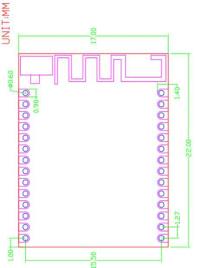
| Pin Number | Symbol | IO Type | Function |
|---|---|---|---|
| 1 | GND | P | Power supply reference ground pin |
| 2 | ANT | RF | RF signal input/output port, which corresponds to ANT of IC |
| 3 | GND | P | Power supply reference ground pin |
| 4 | NC | Not connect | |
| 5 | PA0 | I/O | Corresponding to PA0 of IC |
| 6 | PC5 | I/O | Corresponding to PC5 of IC |
| 7 | PC4 | I/O | Corresponding to PC4 of IC |
| 8 | PA3 | I/O | Corresponding to PA3 of IC |
| 9 | PA4 | I/O | Corresponding to PA4 of IC |
| 10 | PC1 | I/O | Corresponding to PC1 of IC |
| 11 | PC0 | I/O | Corresponding to PC0 of IC |
| 12 | PD4 | I/O | Corresponding to PD4 of IC |
| 13 | PD3 | I/O | Corresponding to PD3 of IC |
| 14 | PD2 | I/O | Corresponding to PD2 of IC |
| 15 | NC | Not connect | |
| 16 | NC | Not connect | |
| 17 | PB0 | I/O | Corresponding to PB0 of IC |
| 18 | PB1 | I/O | Corresponding to PB1 of IC |
| 19 | NC | Not connect | |
| 20 | GND | P | Power supply reference ground pin |
| 21 | VCC | P | Power supply pin (3.3V) |
| 22 | RX0 | I | Corresponding to internal RXD0 of IC |
| 23 | TX0 | O | Corresponding to internal TXD0 of IC |
| 24 | SWDIO | I/O | Corresponding to internal SWDIO of IC |
| 25 | SWCLK | I/O | Corresponding to PF2 of IC |
| 26 | PC3 | I/O | Corresponding to PF3 of IC |
| 27 | PC2 | I/O | Not connect |
| 28 | nRESET | I | Hardware reset pin, which is at a high level by default and is active at a low level |
• P indicates power supply pins, I/O indicates input/output pins
3. Electrical parameters of DSM-05D BLE Module
| Parameter | Description | Typical value | Minimum value | Maximum value | Unit |
|---|---|---|---|---|---|
| Ts | Storage temperature | -50 | 105 | ℃ | |
| VCC | Power supply voltage | 1.71 | 3.8 | V | |
| Static electricity voltage (human body model) | TAMB-25℃ | - | KV | ||
| Static electricity voltage (machine model) | TAMB-25℃ | - | KV |
| Parameter | Description | Minimum value | Maximum value | Typical value | Unit |
|---|---|---|---|---|---|
| Ta | Working temperature | -40 | 125 | - | ℃ |
| VCC | Power supply voltage | 1.71 | 3.8 | 3 | V |
| VIL | I/O low-level input | - | I0VDD*0.3 | V | |
| VIH | I/O high-level input | I0VDD*0.7 | - | - | V |
| VOL | I/O low-level output | - | I0VDD*0.2 | - | V |
| VOH | I/O high-level output | I0VDD*0.8 | - | - | V |
3.3. Current consumption during constant transmission and receiving
| Working status | Mode | TX Power/ Receiving | Typical value | Average value | Unit |
|---|---|---|---|---|---|
| TX | CW Mode | +20dBm | 185 | mA | |
| TX | CW Mode | +10dBm | 60.8 | mA | |
| TX | CW Mode | +0dBm | 10.5 | mA | |
| RX | 2Mbps | Constant receiving | 9.4 | mA | |
| RX | 1Mbps | Constant receiving | 8.8 | mA | |
| RX | 500Kbps | Constant receiving | 9.1 | mA | |
| RX | 125Kbps | Constant receiving | 9 |
4. RF features of DSM-05D BLE Module
| Parameter | Description |
|---|---|
| Frequency band | 2.412~2.484GHz |
| Wi-Fi standard | BLE5.1 |
| Data transmission rate | 2Mbps max |
| Antenna type | PCB antenna with a gain of 1dBi. IPEX (optional) |
4.2. TX performance (Performance during constant transmission)
| Parameter | Minimum value | Typical value | Maximum value | Unit |
|---|---|---|---|---|
| Maximum output power | - | 19.5 | - | dBm |
| Minimum output power | - | -20.5 | - | dBm |
| Output power adjustment step | - | 0.5 | dBm | |
| Output spectrum adjacent-channel rejection ratio | - | -47 | - | dBc |
| Frequency error | -15 | - | 15 | ppm |
| Parameter | Minimum value | Typical value | Maximum value | Unit |
|---|---|---|---|---|
| PER<1%, RX sensitivity(BLE 250Kbps) | -95 | -94 | -93 | dBm |
5. Antenna of DSM-05D BLE Module
This product uses an onboard PCB antenna or IPEX.
To ensure optimal RF performance, it is recommended that the antenna be at least 15 mm away from other metal parts. If metal materials are wrapped around the antenna, the wireless signals will be reduced greatly, deteriorating the RF performance.
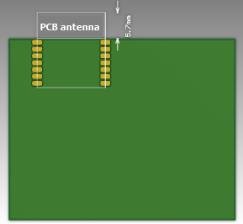
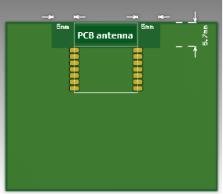
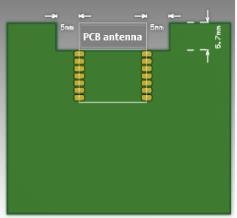
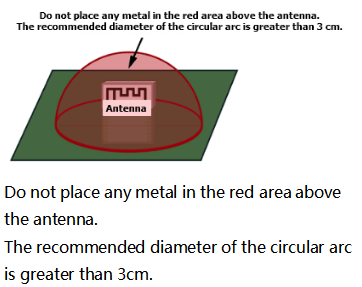
7. Production instructions of DSM-05D BLE Module
1. Use an SMT placement machine to mount components to the stamp hole module that DUSUN produces within 24 hours after the module is unpacked and the firmware is burned. If not, vacuum packs the module again. Bake the module before mounting components to the module.
- SMT placement equipment:
- Reflow soldering machine
- Automated optical inspection (AOI) equipment
- Nozzle with a 6 mm to 8 mm diameter
- Baking equipment:
- Cabinet oven
- Anti-static heat-resistant trays
- Anti-static heat-resistant gloves
2. Storage conditions for a delivered module are as follows:
- The moisture-proof bag is placed in an environment where the temperature is below 30 ℃ and the relative humidity is lower than 70%.
- The shelf life of a dry-packaged product is six months from the date when the product is packaged and sealed.
- The package contains a humidity indicator card (HIC).

3.Bake a module based on HIC status as follows when you unpack the module package:
- If the 30%, 40%, and 50% circles are blue, bake the module for 2 consecutive hours.
- If the 30% circle is pink, bake the module for 4 consecutive hours.
- If the 30% and 40% circles are pink, bake the module for 6 consecutive hours.
- If the 30%, 40%, and 50% circles are pink, bake the module for 12 consecutive hours.
4.Baking settings:
- Baking temperature: 125±5℃
- Alarm temperature: 130℃
- SMT placement ready temperature after natural cooling: < 36℃
- Number of drying times: 1
- Rebaking condition: The module is not soldered within 12 hours after baking.
5.Do not use SMT to process modules that have been unpacked for over three months. Electroless nickel immersion gold (ENIG) is used for the PCBs. If the solder pads are exposed to the air for over three months, they will be oxidized severely and dry joints or solder skips may occur. Roombanker is not liable for such problems and consequences.
6.Before SMT placement, take electrostatic discharge (ESD) protective measures.
7.To reduce the reflow defect rate, draw 10% of the products for visual inspection and AOI before first SMT placement to determine a proper oven temperature and component placement method. Draw 5 to 10 modules every hour from subsequent batches for visual inspection and AOI.
7.1. Recommended oven temperature curve
Perform SMT placement based on the following reflow oven temperature curve. The highest temperature is 245℃.
Based on the IPC/JEDEC standard, perform reflow soldering on a module at most twice.
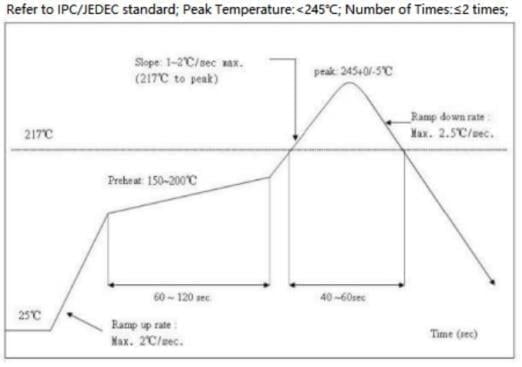
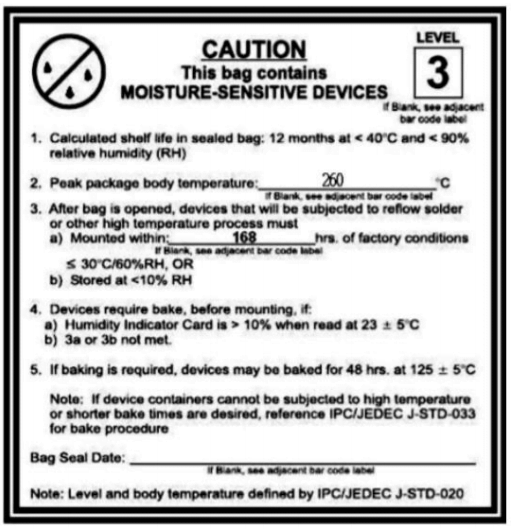
8. MOQ and packing
| Product model | MOQ(pcs) | Packing method | Number of Modules in each reel pack | Number of reel packs in each box |
|---|---|---|---|---|
| DSM-05D | 2800 | Carrier tape and reel packing | 700 | 4 |

